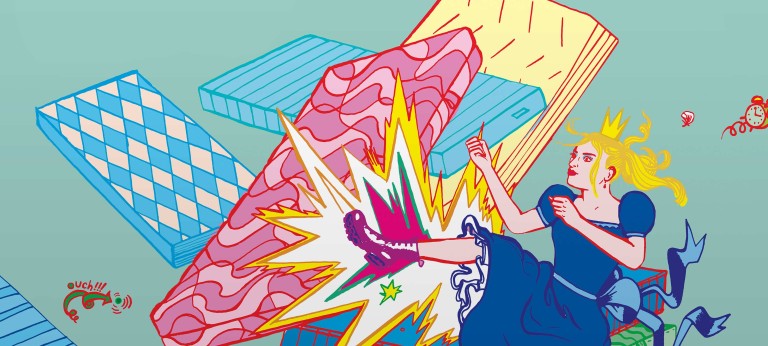Breaking the rules
![{[downloads[language].preview]}](https://www.rolandberger.com/publications/publication_image/Think_Act_Magazine_Breaking_the_rules_Cover_download_preview.jpg)
Is breaking the rules a crucial skill? We examine how the people who have made their own rules also significantly shaped the world of business.


by Michael Hann
illustrations by Katharina Gschwendtner
Read more about the topic "Breaking the rules"
Conventional logic would have doomed Casper's business model to failure, but the US mattress retailer has proven that when it comes to waking up a tired industry, you have to set your own rules.
Manhattan, early September: It's a warm morning and the mattress shop at 627 Broadway is empty. That's not entirely surprising – given that it's recommended to replace a mattress every seven to 10 years, a mattress store is unlikely ever to be teeming with shoppers. What's more surprising is that Casper, the online retailer revolutionizing the mattress business, exists at all – and that this is just one of 18 stores that have opened so far out of a planned 200. A Casper store is nothing like a normal mattress retailer: There are no strip-lit acres of beds with lengthy information sheets on top of them. And when you lie on these mattresses, it's inside of miniature houses at the back of the shop. Or you can make an appointment at The Dreamery, where you book a 45-minute slot in a private pod. It feels much more like a lifestyle brand than a bedding company.
Casper was the brainchild of five co-founders – Philip Krim (now its CEO), Neil Parikh, Luke Sherwin, Jeff Chapin and Gabe Flateman. "The idea for Casper was born when my co-founders and I realized that everyone in our co-working space was downing green juice and wearing fitness trackers — but still falling asleep at their desks," says Parikh, now the company's COO. "It seemed they were taking healthy eating and fitness seriously, but not sleep. So we set out to elevate sleep as a pillar of wellness and improve how people are getting their shut-eye."
"The shopping landscape is no longer mono-channel –customers are traversing between online and offline worlds."
The genius of Casper was that the industry it launched into on April 22, 2014 was inefficient, dominated by complacent big players and had low levels of customer satisfaction. Casper's opportunity lay in those weaknesses. Mattress retailing required large, expensive spaces for an item that was not sold in bulk and cost a great deal to deliver. Mattresses were sold at a massive markup, without yielding great profits. "One of the things that made it a bad industry was that if you looked at the stock prices on the few publicly traded firms, they were for many years prior to Casper's launch stalled or declining. "High cost, high margin, but low profitability – that was the issue," says Len Sherman, a Columbia Business School professor who has studied Casper. Casper's idea was simple: sell one single type of mattress over the internet, then roll them into boxes small enough to be delivered by UPS. But how to persuade people they wouldn't be cursed with something horrible, given they didn't have the chance to try it out first? Tell them they could return the mattress within 100 days, which proved to be "an extremely important part of our shopping experience," Parikh says.
But no choice? Just one kind of mattress? Didn't that go against every piece of received retail wisdom? Sherman remembers Philip Krim explaining the logic of no choice to him. "If you go to stay in a quality hotel, you don't get a menu that asks if you want a room with a hard mattress or a soft mattress. You assume you are paying a premium price to get a high-quality mattress. I was a road warrior, traveling for three to five years, four days a week. I can't count the number of hotels I slept in, and I can't remember ever waking up, ever, and saying 'Boy, that sucked.' That was his analogy: 'If hotels can compete on the basis of offering a single high quality product, so can I.'"
Casper assumed people wanted something new from the mattress-buying experience, and they were right. It sold out of inventory – 40 mattresses, which its founders had expected to take six weeks – on it first day of trading. It reached its first-year target of $1.8 million in sales within 60 days, and then just kept growing. It ended up selling $100 million in 2015, its first full year of operation, and doubled that in 2016. It raised enough venture capital funding to have the firm valued at $750 million, prompting a $1 billion takeover bid by the mass market retailer Target, which was rejected – with Target investing instead. (Casper remains private, so its full results are unknown.)
All that success came by doing the opposite of what anyone might have expected. "Casper is a great example of breaking the rules," Sherman says. "They broke this rule about there being good and bad industries, and that you waste your time going into bad industries. Point two, some products just aren't suited to an online purchase. The last thing you'd want to sell online is a mattress, but they proved it could be done. The third thing is the need for personalization. A mattress is such a personal product: It has to be right for you. And Casper concluded, no it didn't."
Parikh takes a little issue with that assessment. "Casper's growth strategy was not about breaking the rules of business, but instead focusing on creating a superior customer experience," he says. But he accepts the company was all about doing things differently. In short, "The mattress industry is notorious for sky-high markups and aggressive sales tactics. With Casper, we saw an opportunity to modernize the industry ."
Casper's 100-day return policy is certainly a practical incentive to buy, but what helped it thrive was the intangible element of an "event" surrounding the purchase, which they built up with shrewd commercial nous. Casper encouraged its customers to create "unboxing" videos and post them to YouTube. They also gave customers Amazon vouchers in return for new customer referrals – and people making videos would post their own referral codes. Something apparently unforced became a hugely successful and cheap advertising campaign.
But Sherman thinks the key rule Casper broke was spending a huge part of their startup funding on hiring the brand agency Red Antler. "Conventional wisdom says that the last thing a startup should do is spend a lot of money worrying about brand strategy and building emotional bonds. But that's exactly what they did. They made a very distinctive brand image ... I would argue that the most clear difference between Casper and the 100-plus online mattress sellers is that they took the time right from the get-go to develop a very, very strong brand image that had elements of approachability and hipness and coolness. You can fill in the adjectives." There, he and Parikh are in agreement. "We knew from very early on that we wanted to create an identity unlike anything else in our industry," Parikh says. "Building our brand in the early stages allowed us to engage with our customers and create a community immediately upon launching."
Casper did silly, funny things – putting vintage books into the boxes of early customers; launching a chatbot to entertain people who couldn't sleep; using social media brilliantly, from encouraging customers to post "unboxing" videos on YouTube, to a Twitter account with "sorry, I overslept" letters for customers to use. "They took an industry that was reviled and hated and made themselves into a likeable, trustworthy company," Sherman says.
After having broken the rules to break into the market, Casper is becoming more conventional – in addition to its own stores, it sells through Target in the US as well as Amazon: "The shopping landscape today is no longer mono-channel – customers are traversing between online and offline worlds," Parikh says. Now offering two designs of mattress and other sleepwares, Casper is on its way to being more than a mattress company and what its founders dreamed of: "the Nike of sleep."

![{[downloads[language].preview]}](https://www.rolandberger.com/publications/publication_image/Think_Act_Magazine_Breaking_the_rules_Cover_download_preview.jpg)
Is breaking the rules a crucial skill? We examine how the people who have made their own rules also significantly shaped the world of business.
Curious about the contents of our newest Think:Act magazine? Receive your very own copy by signing up now! Subscribe here to receive our Think:Act magazine and the latest news from Roland Berger.
